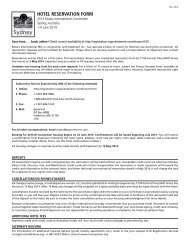Manual del Comité Distrital (249-ES) - Rotary International
Manual del Comité Distrital (249-ES) - Rotary International
Manual del Comité Distrital (249-ES) - Rotary International
Create successful ePaper yourself
Turn your PDF publications into a flip-book with our unique Google optimized e-Paper software.
LEAD<br />
YOUR DISTRICT<br />
Committees<br />
2014-15
CONTENTS<br />
Introduction<br />
Overview<br />
Your Team........................................................................................................................................................................................................................................ 1<br />
Training.................................................................................................................................................................................................................................................. 2<br />
How to Use This <strong>Manual</strong>............................................................................................................................................................................ 2<br />
About District Committees<br />
Responsibilities of All Committees................................................................................................................................ 4<br />
Resources for All Committees...................................................................................................................................................... 4<br />
District Committees in Detail<br />
District Conference Committee.............................................................................................................................................. 5<br />
District Programs Committees.................................................................................................................................................. 6<br />
Extension Committee........................................................................................................................................................................................ 7<br />
Finance Committee................................................................................................................................................................................................. 8<br />
Membership Development Committee................................................................................................................ 9<br />
New Generations Committee......................................................................................................................................................... 11<br />
Nominating Committee................................................................................................................................................................................ 12<br />
Public Relations Committee............................................................................................................................................................. 12<br />
RI Convention Promotion Committee.................................................................................................................... 14<br />
<strong>Rotary</strong> Foundation Committee.................................................................................................................................................. 15<br />
Training Committee............................................................................................................................................................................................... 17<br />
Appendixes<br />
1: District Training Meetings ......................................................................................................................................................... 19<br />
2: District Planning Guide....................................................................................................................................................................... 21<br />
3: Club Committee Structure.......................................................................................................................................................... 28<br />
This is the 2013 edition of Lead Your District: Committees (<strong>249</strong>), formerly<br />
known as the District Committee <strong>Manual</strong>. It is intended for district<br />
committee chairs holding office in 2014-15, 2015-16, and 2016-17. The<br />
information in this publication is based on the Constitution and Bylaws<br />
of <strong>Rotary</strong> <strong>International</strong>, the <strong>Rotary</strong> Code of Policies, and The <strong>Rotary</strong><br />
Foundation Code of Policies. Changes to the documents listed above by the<br />
triennial Council on Legislation, the RI Board of Directors, or The <strong>Rotary</strong><br />
Foundation Trustees override policy as stated in this publication.
INTRODUCTION<br />
Congratulations on your appointment to a district committee.<br />
As a committee member, you will support specific club and district<br />
activities and promote your committee’s message.<br />
In this role, you join the governor, assistant governors, and members<br />
of the other district committees on the district leadership team. At the<br />
district team training seminar, you will discuss how your committee<br />
and the district leadership team will support clubs. Use this manual to<br />
prepare for your term in office. Review it before the seminar, and be<br />
sure to bring it along.<br />
For district committee information not included in this manual, please<br />
refer to the <strong>Rotary</strong> website. <strong>Rotary</strong> will launch a new website in 2013‐14.<br />
This site will make it easier for Rotarians to connect with others who<br />
share their interests. It will also support the exchange of ideas and<br />
collaboration on community service projects, in addition to supplying<br />
<strong>Rotary</strong> news and announcements of local and international events.<br />
The site will make it easier for you, a district officer, to conduct district<br />
business. You will be able to work with others in similar roles in a<br />
secure space.<br />
COMMENTS?<br />
If you have questions or comments about this manual, please submit<br />
them to:<br />
Learning and Development<br />
<strong>Rotary</strong> <strong>International</strong><br />
One <strong>Rotary</strong> Center<br />
1560 Sherman Avenue<br />
Evanston, IL 60201-3698 USA<br />
Email: learn@rotary.org<br />
Phone: +1-847-866-3000<br />
Fax: +1-847-866-9446<br />
d<br />
LEAD YOUR DISTRICT: COMMITTE<strong>ES</strong>
OVERVIEW<br />
You have been selected to be a committee member because of your<br />
expertise and experience. Use this knowledge and your commitment to<br />
<strong>Rotary</strong> to strengthen the clubs in your district. To maximize your impact<br />
in this role, collaborate with other leaders in your district.<br />
YOUR TEAM<br />
You are an integral part of the district leadership team, which is also<br />
made up of your district governor, district governor-elect, and assistant<br />
governors. Work with your governor-elect and other members of the<br />
district leadership team to develop district goals. Assistant governors<br />
will work with clubs on their goals, which should support the goals of<br />
the district.<br />
Create a communication plan that includes how and when you<br />
communicate with clubs, the district governor, your assistant governors,<br />
and other district committee members. The table below lists people to<br />
consider including when working on your communication plan.<br />
Regional leaders District leaders Club leaders<br />
<strong>Rotary</strong> coordinator<br />
<strong>Rotary</strong> public image<br />
coordinator<br />
Regional <strong>Rotary</strong><br />
Foundation<br />
coordinator<br />
Past district<br />
governors<br />
Governor<br />
Governor-elect<br />
Governor-nominee<br />
Committee chairs<br />
Assistant governors<br />
Executive secretaries,<br />
where applicable<br />
Presidents<br />
Secretaries<br />
Executive secretaries<br />
Treasurers<br />
Committee chairs<br />
Trainers<br />
You and your district leadership team should discuss your district’s<br />
communication plan to make sure that everyone is aware of it and in<br />
agreement.<br />
Work with other district committees as well as assistant governors for<br />
maximum impact in your district. Assistant governors have the most<br />
contact with clubs. Consult them to see which clubs may need your<br />
committee’s assistance or to get your committee’s message to clubs.<br />
OVERVIEW<br />
1
TRAINING<br />
In addition to the district team training seminar, where you will<br />
receive training for your role as a committee member or chair, consider<br />
attending other district meetings, such as PETS, the district training<br />
assembly, district leadership seminar, district membership seminar, and<br />
the district <strong>Rotary</strong> Foundation seminar, as appropriate, to meet and talk<br />
with club leaders and to answer questions they may have. Appendix 1:<br />
District Training Meetings has more information about each seminar’s<br />
purpose and intended audience.<br />
You also have the opportunity to offer training for your clubs with<br />
specific needs. For example, if a club wants to learn more about<br />
qualifying for a <strong>Rotary</strong> Foundation grant, a member of the district<br />
<strong>Rotary</strong> Foundation committee can work with the club to develop<br />
training or come and talk about the grants at a club meeting. Find out<br />
from assistant governors, who have regular contact with their assigned<br />
clubs, which ones may benefit from training.<br />
HOW TO USE THIS MANUAL<br />
This manual includes information for all committees, as well as specific<br />
information for each district committee. Review the section about your<br />
particular committee, but also familiarize yourself with the roles of the<br />
other committees to understand where yours may overlap with another,<br />
to determine opportunities for collaboration, and to avoid duplicating<br />
efforts.<br />
Under each recommended district committee are responsibilities, key<br />
messages, and resources. Familiarize yourself with the key messages,<br />
and use them as you interact with clubs in your district.<br />
Responsibilities — These are duties specified in the <strong>Rotary</strong> Code<br />
of Policies.<br />
Key Messages — Use these to communicate your committee’s<br />
value to clubs.<br />
Resources — We recommend materials that are relevant to each<br />
committee. Become familiar with them, and share them, with clubs<br />
that can benefit from the information in them.<br />
2 LEAD YOUR DISTRICT: COMMITTE<strong>ES</strong>
ABOUT DISTRICT<br />
COMMITTE<strong>ES</strong><br />
The RI Board of Directors recommends that districts appoint<br />
committees to perform ongoing administrative functions. These are the<br />
district committees the Board recommends:<br />
• District conference<br />
• District programs (for example, <strong>Rotary</strong> Community Corps and<br />
Vocational Service)<br />
• Extension<br />
• Finance<br />
• Membership development<br />
• New Generations<br />
• Nominating<br />
• Public relations<br />
• RI Convention promotion<br />
• <strong>Rotary</strong> Foundation<br />
• Training<br />
The Board further recommends that districts appoint additional<br />
committees as needed. They may include a district policies and<br />
procedures committee, district community service committee, and<br />
others.<br />
ABOUT DISTRICT COMMITTE<strong>ES</strong><br />
3
R<strong>ES</strong>PONSIBILITI<strong>ES</strong> OF ALL COMMITTE<strong>ES</strong><br />
All district committees are expected to<br />
• Work with the governor, governor-elect, governor-nominee, and<br />
assistant governors to plan strategies for achieving goals<br />
• Promote and attend district training meetings and the district<br />
conference<br />
• Relay information between <strong>Rotary</strong> <strong>International</strong>, the district, and<br />
club members<br />
• Work closely with club leaders to provide support and guidance<br />
• Share materials received from the Secretariat, RI committees, and<br />
regional coordinators<br />
R<strong>ES</strong>OURC<strong>ES</strong> FOR ALL COMMITTE<strong>ES</strong><br />
• <strong>Rotary</strong>.org — <strong>Rotary</strong> will launch a new website in 2013-14. This<br />
site will make it easier for Rotarians to connect with others who<br />
share their interests. It will also support the exchange of ideas and<br />
collaboration on community service projects, in addition to supplying<br />
<strong>Rotary</strong> news and announcements of local and international events.<br />
The site will make it easier for you, a district officer, to conduct<br />
district business. You will be able to work with others in similar roles<br />
in a secure space.<br />
• <strong>Rotary</strong> Club Central — An online tool clubs use to set goals and track<br />
accomplishments. District leaders have access to a district view, used<br />
to help clubs in their district set goals and communicate about those<br />
goals and accomplishments with other district leaders.<br />
• Club and District Support representatives — Staff members at<br />
<strong>Rotary</strong> headquarters and international offices who can answer many<br />
administrative questions and direct other inquiries to appropriate<br />
Secretariat staff.<br />
• Official Directory (007) — Contact information for RI and Foundation<br />
officers, committees, resource groups, and Secretariat staff; a<br />
worldwide list of districts and governors; and an alphabetical listing<br />
of clubs by district, including contact information. Issued every year.<br />
Available to members on rotary.org.<br />
• <strong>Manual</strong> of Procedure (035) — RI and club constitutional documents<br />
as well as policies and procedures of <strong>Rotary</strong> <strong>International</strong> and<br />
the Foundation established by legislative action, the RI Board of<br />
Directors, and the Foundation Trustees. Issued every three years after<br />
the Council on Legislation.<br />
• Regional coordinators — <strong>Rotary</strong> coordinators, regional <strong>Rotary</strong><br />
Foundation coordinators, and <strong>Rotary</strong> public image coordinators are<br />
appointed to advise on their areas of expertise.<br />
• Shop.rotary.org — Online store for <strong>Rotary</strong> resources.<br />
4 LEAD YOUR DISTRICT: COMMITTE<strong>ES</strong>
DISTRICT<br />
COMMITTE<strong>ES</strong><br />
IN DETAIL<br />
DISTRICT CONFERENCE COMMITTEE<br />
This committee plans and promotes the district conference and helps<br />
ensure maximum attendance.<br />
R<strong>ES</strong>PONSIBILITI<strong>ES</strong><br />
• Recommend the district conference venue and make all related<br />
logistical arrangements.<br />
• Coordinate conference finances to ensure maximum attendance.<br />
• Promote conference attendance with particular emphasis on new<br />
Rotarians, new clubs, and representation from every club.<br />
• Publicize the district conference to external audiences, such as the<br />
media, community leaders, and beneficiaries of <strong>Rotary</strong>’s programs.<br />
• Arrange a district leadership seminar in cooperation with the district<br />
trainer to be held in conjunction with the conference.<br />
• Consider including time in the agenda to report on <strong>Rotary</strong> Foundation<br />
activities if no report has been or will be provided at another district<br />
meeting.<br />
KEY M<strong>ES</strong>SAG<strong>ES</strong><br />
• The district conference celebrates the achievements of clubs and<br />
Rotarians in the district.<br />
• The conference offers clubs an opportunity to share ideas for service<br />
projects, programs, and fundraisers.<br />
• Club members can meet fellow Rotarians from other clubs at the<br />
district conference.<br />
DISTRICT COMMITTE<strong>ES</strong> IN DETAIL<br />
5
R<strong>ES</strong>OURC<strong>ES</strong><br />
• District Conference <strong>Manual</strong> (800) — <strong>Manual</strong> that includes<br />
information about planning and promoting your conference and<br />
conducting conference business.<br />
• Ideas for the Promotion of District Conferences<br />
DISTRICT PROGRAMS COMMITTE<strong>ES</strong><br />
These committees promote and administer ongoing district activities,<br />
projects, or <strong>Rotary</strong> programs, providing support and guidance to clubs.<br />
Districts often have a specific committee for each of the programs and<br />
activities offered. <strong>Rotary</strong> <strong>International</strong> has resources for the following:<br />
• Community Service<br />
• <strong>International</strong> Service<br />
• Rotarian Action Groups<br />
• <strong>Rotary</strong> Community Corps<br />
• <strong>Rotary</strong> Fellowships<br />
• <strong>Rotary</strong> Friendship Exchange<br />
• Vocational Service<br />
R<strong>ES</strong>PONSIBILITI<strong>ES</strong><br />
• Coordinate districtwide efforts related to the program.<br />
• Promote program participation through regular contact with<br />
assistant governors and clubs.<br />
• Promote successful programs at district meetings and during club<br />
visits by inviting participants to speak and encouraging clubs to get<br />
involved.<br />
• Promote publication of <strong>Rotary</strong> program goals and achievements in<br />
all appropriate <strong>Rotary</strong> and non-<strong>Rotary</strong> communication media in the<br />
district.<br />
• Consult with <strong>Rotary</strong> coordinators to identify program expertise in<br />
your region.<br />
• Assist club program committee chairs in carrying out their<br />
responsibilities.<br />
• Encourage clubs to determine whether the program can address local<br />
needs.<br />
• Identify potential areas of cooperation between district programs and<br />
local, non-<strong>Rotary</strong> service organizations.<br />
• Encourage participants in one program to participate in others<br />
offered in the district.<br />
6 LEAD YOUR DISTRICT: COMMITTE<strong>ES</strong>
KEY M<strong>ES</strong>SAG<strong>ES</strong><br />
• There are many ways that clubs and their members can reach out<br />
and connect with fellow Rotarians and others, both locally and<br />
internationally.<br />
• There are many opportunities for clubs and their members to<br />
partner with like-minded individuals and organizations to enhance<br />
fellowship and strengthen service projects.<br />
• Clubs are encouraged to serve their communities by undertaking<br />
challenging, sustainable projects that address significant needs and<br />
enhance <strong>Rotary</strong>’s public image in the process.<br />
R<strong>ES</strong>OURC<strong>ES</strong><br />
• <strong>Rotary</strong> Showcase — Online project gallery that allows Rotarians to<br />
share stories, photos, and descriptions of the impact of their clubs’<br />
service projects, and allows them to post on Facebook. Promote it to<br />
clubs as a way to showcase their service projects.<br />
• <strong>Rotary</strong>’s Areas of Focus (965) — An introduction to these critical<br />
humanitarian needs that Rotarians are addressing worldwide, with<br />
examples of service projects for each.<br />
• Communities in Action: A Guide to Effective Projects / Community<br />
Assessment Tools (605) — Comprehensive instructions for planning,<br />
conducting, and evaluating a service project and detailed gui<strong>del</strong>ines<br />
for conducting effective community assessments.<br />
• <strong>Rotary</strong> coordinators — The 41 RCs appointed by the RI presidentelect<br />
work to create stronger, more dynamic, and more effective clubs<br />
and districts. <strong>Rotary</strong> coordinators work as facilitators, motivators,<br />
consultants, and resource persons for clubs and districts in the<br />
region and help them create and implement plans to build better<br />
<strong>Rotary</strong> clubs.<br />
EXTENSION COMMITTEE<br />
This committee develops and implements plans to organize new <strong>Rotary</strong><br />
clubs within the district.<br />
R<strong>ES</strong>PONSIBILITI<strong>ES</strong><br />
• Identify communities without <strong>Rotary</strong> clubs that have a population<br />
capable of meeting the requirements for chartering a new club.<br />
• Find communities where additional <strong>Rotary</strong> clubs could be established<br />
without detracting from service provided by existing clubs.<br />
• Assist in organizing and establishing new clubs.<br />
Training and Support<br />
The chair and as many committee members as possible should attend a<br />
training meeting conducted by the <strong>Rotary</strong> coordinator.<br />
DISTRICT COMMITTE<strong>ES</strong> IN DETAIL<br />
7
KEY M<strong>ES</strong>SAG<strong>ES</strong><br />
• It is important for clubs to look for opportunities to start a new <strong>Rotary</strong><br />
club.<br />
• A new <strong>Rotary</strong> club means more service for the community.<br />
• Sponsor clubs have the responsibility of supporting new clubs for at<br />
least two years.<br />
R<strong>ES</strong>OURC<strong>ES</strong><br />
• Organizing New Clubs (808) — Resource designed for district<br />
governors and their representatives that provides guidance in<br />
organizing new clubs.<br />
• <strong>Rotary</strong> coordinators — The 41 RCs appointed by the RI presidentelect<br />
work to create stronger, more dynamic, and more effective clubs<br />
and districts. <strong>Rotary</strong> coordinators work as facilitators, motivators,<br />
consultants, and resource persons for clubs and districts in the region<br />
and help them create and implement plans to build better <strong>Rotary</strong><br />
clubs.<br />
FINANCE COMMITTEE<br />
This committee supervises district funds by reviewing and studying<br />
the amount of per capita levy and district administration expenses.<br />
It also prepares annual reports on the status of the district’s finances.<br />
The district treasurer serves as an ex officio member of the committee.<br />
R<strong>ES</strong>PONSIBILITI<strong>ES</strong><br />
• In cooperation with the governor, create a district budget to be<br />
submitted to clubs at least four weeks before the presidents-elect<br />
training seminar (PETS) or the district training assembly and<br />
approved at a meeting of incoming club presidents.<br />
• Review and recommend the amount of per capita levy. Any per capita<br />
levy must be approved by at least three-fourths of the incoming club<br />
presidents at PETS or the district training assembly, or by a majority<br />
of the electors present and voting at a district conference.<br />
• Ensure that proper income and expense records are kept.<br />
• Prepare an annual financial report to be presented at the district<br />
training assembly.<br />
• Ensure that a member of the committee (preferably the treasurer)<br />
and the district governor are the authorized signatories for district<br />
bank accounts. Both signatures are required for any withdrawal.<br />
• Consider working with the district <strong>Rotary</strong> Foundation committee<br />
chair to disburse grant funds and ensure that a proper record of grant<br />
activity is maintained for reporting purposes.<br />
8 LEAD YOUR DISTRICT: COMMITTE<strong>ES</strong>
KEY M<strong>ES</strong>SAG<strong>ES</strong><br />
• Clubs are expected to remain in good financial standing with <strong>Rotary</strong><br />
<strong>International</strong> and the district.<br />
• Maintaining transparent financial practices ensures accountability.<br />
• Practicing good stewardship of club funds ensures they are used<br />
properly.<br />
R<strong>ES</strong>OURC<strong>ES</strong><br />
• District Finance Committee Resource Guide — A comprehensive<br />
guide covering the role and responsibilities of the district finance<br />
committee.<br />
• Club Treasurer’s <strong>Manual</strong> (220) — A reference manual that explains<br />
the responsibilities of the club treasurer.<br />
• Financial representatives at <strong>Rotary</strong> headquarters — Financial service<br />
representatives who can answer financial questions for your region.<br />
• Club and District Support representatives — Staff at <strong>Rotary</strong><br />
headquarters and international offices who can answer general<br />
finance questions.<br />
MEMBERSHIP DEVELOPMENT COMMITTEE<br />
This committee identifies, markets, and implements membership<br />
development strategies that are appropriate for the district and will<br />
result in membership growth.<br />
R<strong>ES</strong>PONSIBILITI<strong>ES</strong><br />
• Plan, market, and conduct a district membership seminar in<br />
consultation with the governor and district trainer.<br />
• Assist clubs’ member recruitment efforts, paying special attention to<br />
small and weak clubs.<br />
• Encourage each club to strive to represent the demographic<br />
composition of the community’s professionals.<br />
• Ensure that clubs are aware of the membership tools available from<br />
<strong>Rotary</strong> headquarters and that membership information is reported<br />
promptly to <strong>Rotary</strong> headquarters.<br />
• Work and communicate regularly with the district governor and club<br />
leaders to ensure that the district achieves its membership goals.<br />
• Coordinate districtwide membership development activities.<br />
• Encourage clubs to participate in <strong>Rotary</strong> or presidential membership<br />
development recognition programs.<br />
• Work with the district extension and public relations committees to<br />
plan activities that will aid membership development efforts.<br />
• Encourage clubs to develop and implement innovative membership<br />
development strategies.<br />
DISTRICT COMMITTE<strong>ES</strong> IN DETAIL<br />
9
• Assist club membership committee chairs in carrying out their<br />
responsibilities.<br />
• Visit clubs to speak about innovation, flexibility, diversity, and ways to<br />
engage members.<br />
• Work with the <strong>Rotary</strong> coordinator to plan membership activities in<br />
the district.<br />
• Ensure that each club committee has a copy of the Membership<br />
Development Resource Guide (417) and is aware of resources available<br />
on rotary.org.<br />
Training and Support<br />
The chair and as many committee members as possible should attend a<br />
training meeting conducted by the <strong>Rotary</strong> coordinator.<br />
KEY M<strong>ES</strong>SAG<strong>ES</strong><br />
• Both attracting new members and keeping existing members are<br />
important to membership development.<br />
• Providing updates and training for new and current club members<br />
is vital to keeping them engaged in the club, the district, and the<br />
organization as a whole.<br />
• Asking past participants of <strong>Rotary</strong> programs to share their<br />
experiences can attract potential members and remind members of<br />
<strong>Rotary</strong>’s impact.<br />
R<strong>ES</strong>OURC<strong>ES</strong><br />
• Membership Development Resource Guide (417) — A publication that<br />
identifies best practices and tips for attracting new members and<br />
keeping members engaged and active.<br />
• Club Assessment Tools — Online supplement to the Membership<br />
Development Resource Guide that offers useful tools to assess the<br />
current and future state of clubs.<br />
• Club Secretary’s <strong>Manual</strong> (229) — A reference manual that describes<br />
club secretary responsibilities, including the reporting of new<br />
members.<br />
• <strong>Rotary</strong> coordinators — The 41 RCs appointed by the RI presidentelect<br />
work to create stronger, more dynamic, and more effective clubs<br />
and districts. <strong>Rotary</strong> coordinators work as facilitators, motivators,<br />
consultants, and resource persons for clubs and districts in the region<br />
and help them create and implement plans to build better <strong>Rotary</strong><br />
clubs.<br />
10 LEAD YOUR DISTRICT: COMMITTE<strong>ES</strong>
NEW GENERATIONS COMMITTEE<br />
This committee develops, implements, and supports New Generations<br />
activities in the district and coordinates with other committees to<br />
engage youth. The district governor may determine the best structure<br />
for the committee and its relationships with other district committees.<br />
R<strong>ES</strong>PONSIBILITI<strong>ES</strong><br />
• Promote New Generations Month (September).<br />
• Coordinate with the district Interact, Rotaract, <strong>Rotary</strong> Youth<br />
Leadership Awards (RYLA), Youth Exchange, Community Service,<br />
<strong>International</strong> Service, and Vocational Service committees to foster<br />
cooperation.<br />
• Emphasize service in each of the New Generations programs<br />
(Interact, Rotaract, RYLA, and Youth Exchange).<br />
• Encourage and facilitate relationships with other organizations to<br />
expand opportunities for young people.<br />
• Encourage and facilitate transition of young people from one<br />
program or activity to another, and offer progressively increasing<br />
responsibility as young people acquire leadership skills.<br />
• Engage with former New Generations program participants to<br />
maintain their ongoing contact with <strong>Rotary</strong>.<br />
KEY M<strong>ES</strong>SAG<strong>ES</strong><br />
• New Generations programs connect young people with a global<br />
network of friendship, engagement, and action.<br />
• Rotarians can empower young people to develop the skills they need<br />
to become leaders who can have an impact in their local communities.<br />
• Participating in a New Generations program is a fulfilling experience<br />
for everyone involved and can create a lifelong relationship with<br />
<strong>Rotary</strong>.<br />
• Protecting youth participants from physical, sexual, and emotional<br />
abuse is a critical responsibility of every adult participant, both<br />
Rotarians and non-Rotarians.<br />
R<strong>ES</strong>OURC<strong>ES</strong><br />
• An Introduction to New Generations Service (735) — Information<br />
and resources related to Interact, Rotaract, <strong>Rotary</strong> Youth Exchange,<br />
RYLA, youth protection, and program alumni activities.<br />
• Abuse and Harassment Prevention Training <strong>Manual</strong> and Leaders’<br />
Guide (775) — Youth protection guidance that can be modified to<br />
comply with local laws and address specific situations to create and<br />
maintain the safest possible environment for all participants.<br />
DISTRICT COMMITTE<strong>ES</strong> IN DETAIL<br />
11
NOMINATING COMMITTEE<br />
This committee nominates the most qualified available Rotarian to<br />
serve as governor. Unless excused by the RI Board, districts are required<br />
to use a nominating committee procedure, ballot-by-mail, or vote at the<br />
district conference for all district elections.<br />
R<strong>ES</strong>PONSIBILITI<strong>ES</strong><br />
• Conduct a selection process in a dignified, responsible manner in<br />
accord with the principles of <strong>Rotary</strong>.<br />
• Seek out and nominate the best qualified person.<br />
• Interview all candidates for governor, whether they are suggested by<br />
clubs or by the nominating committee. Each interview of governornominee<br />
candidates should satisfy the minimum needs specified in<br />
the <strong>Rotary</strong> Code of Policies, Governor Nominee Selection, section<br />
19.030.<br />
• Ensure that no member, alternate member, or candidate for<br />
membership on a nominating committee is eligible to be nominated<br />
for any office being considered by that committee.<br />
R<strong>ES</strong>OURCE<br />
Article 13 of the RI Bylaws in the <strong>Manual</strong> of Procedure (035) includes<br />
details on the process of selecting the district governor.<br />
PUBLIC RELATIONS COMMITTEE<br />
This committee promotes <strong>Rotary</strong> to external audiences and fosters<br />
understanding, appreciation, and support for the organization’s<br />
programs. It also helps Rotarians understand that effective external<br />
publicity, favorable public relations, and a positive image build support<br />
for the organization, inspire potential donors, and attract possible<br />
candidates for membership.<br />
R<strong>ES</strong>PONSIBILITI<strong>ES</strong><br />
• Maintain contact with the district governor and key committee<br />
chairs to stay informed about district projects and activities that can<br />
be promoted — particularly those that are of interest to the general<br />
public.<br />
• Promote <strong>Rotary</strong> to external audiences, such as the media, community<br />
leaders, potential partner organizations, program beneficiaries, and<br />
the general public.<br />
• Contact the media with newsworthy stories of district projects and<br />
events, and share district and club stories via social media.<br />
• Share <strong>Rotary</strong> public relations materials with clubs and encourage<br />
them to make public relations outreach a priority, using both<br />
traditional and digital media.<br />
12 LEAD YOUR DISTRICT: COMMITTE<strong>ES</strong>
• Seek opportunities to speak to individual clubs about the importance<br />
of club public relations, including developing websites geared toward<br />
the general public.<br />
• Promote all aspects of <strong>Rotary</strong> activities, such as PolioPlus, the six<br />
areas of focus, grant successes, alumni activities, and awards to<br />
districts and the <strong>Rotary</strong> community.<br />
Training and Support<br />
Committee members should attend public relations workshops held in<br />
conjunction with <strong>Rotary</strong> training meetings whenever possible, as well as<br />
the regional seminar held by the <strong>Rotary</strong> public image coordinator.<br />
KEY M<strong>ES</strong>SAG<strong>ES</strong><br />
• Strategize public relations outreach as part of project planning.<br />
• Incorporate both traditional and social media in public relations<br />
efforts.<br />
• Club members, as members of the community, know the local media<br />
and should use that knowledge and their connections.<br />
• Clubs should take good public relations outreach ideas and make<br />
them fit their local needs.<br />
R<strong>ES</strong>OURC<strong>ES</strong><br />
• <strong>Rotary</strong>’s Media Center — Multimedia site featuring the latest news<br />
stories, <strong>Rotary</strong> advertisements, and links to <strong>Rotary</strong> social media sites.<br />
• <strong>Rotary</strong> PR Tips — A brief e-newsletter that provides examples of<br />
<strong>Rotary</strong> in the news, PR tools and training, and outreach ideas.<br />
• Weekly Update — E-newsletter highlighting the latest <strong>Rotary</strong> news.<br />
It can be used for club and district newsletters and websites.<br />
• Endpolionow.org — New website that has compelling stories about<br />
polio eradication that you can share; interactive, dynamic graphics<br />
that help you tell the story; information about how donations can be<br />
used to fight polio; and links to polio communications resources that<br />
will help you educate and inspire others to end polio now.<br />
• <strong>Rotary</strong> public image coordinators — The 41 RPICs appointed by the<br />
RI president-elect work to enhance the public image of <strong>Rotary</strong> by<br />
increasing recognition of the organization’s humanitarian efforts<br />
among Rotarians and the general public. This involves helping clubs<br />
and districts communicate <strong>Rotary</strong>’s success stories to the media,<br />
local government officials, civic leaders, and communities. RPICs can<br />
help with applications for public image grants and assist and train at<br />
district seminars.<br />
DISTRICT COMMITTE<strong>ES</strong> IN DETAIL<br />
13
14 LEAD YOUR DISTRICT: COMMITTE<strong>ES</strong><br />
RI CONVENTION PROMOTION COMMITTEE<br />
This committee promotes attendance at the annual RI Convention to<br />
Rotarians throughout the district.<br />
R<strong>ES</strong>PONSIBILITI<strong>ES</strong><br />
• Attend club and district meetings to promote the convention.<br />
• Serve as a local resource for convention materials and information.<br />
• Communicate with and assist the zone-level RI Convention<br />
promotion committee member assigned to your district.<br />
• Contact potential registrants.<br />
• Contribute convention articles and information to district<br />
newsletters, publications, and directories.<br />
• Translate important convention information into local languages,<br />
if necessary.<br />
• Create or expand a district website with links to convention<br />
information.<br />
Many district conference committees also<br />
• Organize district group tours for the convention (especially for firsttime<br />
attendees).<br />
• Invite prospective Rotarians to attend the convention. (This is done<br />
mainly by host districts.)<br />
• Carry out marketing campaigns and promote contests put on by the<br />
RI Convention Promotion Committee.<br />
KEY M<strong>ES</strong>SAG<strong>ES</strong><br />
• The RI Convention inspires, informs, and engages Rotarians by<br />
offering an opportunity to share stories and experiences with fellow<br />
Rotarians from around the world.<br />
• Club and district officers will be able to network to find service<br />
partners.<br />
• Rotarians and their guests will be inspired by speakers who have<br />
made changes that have improved the lives of others.<br />
• The convention allows clubs to learn more about programs offered<br />
by <strong>Rotary</strong> and participate in sessions designed to provide in-depth<br />
training and skill development in leadership, the six areas of focus,<br />
and other topics.<br />
R<strong>ES</strong>OURC<strong>ES</strong><br />
• Convention pages on rotary.org — Information about convention<br />
promotion, registration, housing, and booths.<br />
• The Convention Promotion booklet (996) — A resource for all clubs<br />
and districts that has information about the destination, registration,<br />
the venue, a preliminary schedule, and other information.<br />
• RI Convention Update — E-newsletter with updates, deadlines, and<br />
news stories sent out five times a year.
ROTARY FOUNDATION COMMITTEE<br />
This committee assists the governor in educating Rotarians about<br />
Foundation programs and fundraising activities and inspiring them<br />
to participate. It serves as a liaison between the Foundation and<br />
club members. The district governor is an ex officio member of the<br />
committee.<br />
The members of the district <strong>Rotary</strong> Foundation committee serve as<br />
chairs of four subcommittees:<br />
• Fundraising — Coordinates the district’s fundraising goals for the<br />
Annual Fund and the Endowment Fund, soliciting gifts and educating<br />
Rotarians about their gift options<br />
• Grants — Oversees the qualification of clubs, assists clubs in applying<br />
for <strong>Rotary</strong> Foundation grants, ensures that proper stewardship and<br />
grant management practices are implemented, reports irregularities<br />
in grant-related activities, and promotes <strong>Rotary</strong> Foundation grants<br />
• PolioPlus — Supports <strong>Rotary</strong>’s commitment to polio eradication and<br />
encourages participation in PolioPlus activities<br />
• Stewardship — Ensures the careful management of <strong>Rotary</strong><br />
Foundation grant funds and educates Rotarians on proper and<br />
effective grant management<br />
Districts are free to appoint additional subcommittees to support their<br />
activities and goals. There are six additional subcommittees that can be<br />
reported online but are not required:<br />
• Alumni subcommittee<br />
• Annual Fund subcommittee<br />
• Endowment Fund subcommittee<br />
• <strong>Rotary</strong> Peace Fellowships subcommittee<br />
• Scholarships subcommittee<br />
• Vocational training team subcommittee<br />
R<strong>ES</strong>PONSIBILITI<strong>ES</strong><br />
• Assist the district governor in presenting a district <strong>Rotary</strong> Foundation<br />
seminar for club presidents, presidents-elect, club Foundation<br />
committees, and other Rotarians.<br />
• Help the district training committee conduct Foundation sessions<br />
each year at the presidents-elect training seminar and district<br />
training assembly.<br />
• Encourage clubs to offer at least two programs on the Foundation<br />
annually, paying special attention to November, which is <strong>Rotary</strong><br />
Foundation Month.<br />
• Promote high levels of financial support for Foundation programs by<br />
encouraging regular contributions to the Annual Fund and gifts to the<br />
Endowment Fund.<br />
• Coordinate all district Foundation fundraising and program<br />
participation.<br />
DISTRICT COMMITTE<strong>ES</strong> IN DETAIL<br />
15
• Encourage clubs to find current Foundation information at rotary.org.<br />
• Decide, in consultation with the district governor and governor-elect,<br />
how to use the District Designated Fund (DDF).<br />
• Help the governor-elect gather input from club-level Rotarians before<br />
establishing district Foundation goals for the upcoming year.<br />
• Represent the committee in the DDF distribution process and, with<br />
the district governor, authorize the use of the fund for program, grant,<br />
and fundraising purposes.<br />
• Ensure that satisfactory final reports on district-sponsored programs<br />
and activities are submitted to The <strong>Rotary</strong> Foundation in a timely<br />
manner.<br />
• Serve as an ex officio member of all subcommittees, maintain contact<br />
with them to stay informed of their progress, and directly support<br />
them as needed.<br />
• Help the governor select qualified recipients for Foundation awards.<br />
• Qualify the district and its clubs to use <strong>Rotary</strong> Foundation grants.<br />
• Ensure that all clubs interested in participating in <strong>Rotary</strong> Foundation<br />
grants are able to qualify.<br />
• Help organize grant management seminars to qualify clubs.<br />
• Confirm that clubs applying for global grants are qualified.<br />
Training and Support<br />
All members of the district <strong>Rotary</strong> Foundation committee are expected<br />
to attend a regional <strong>Rotary</strong> Foundation seminar conducted by a regional<br />
<strong>Rotary</strong> Foundation coordinator.<br />
KEY M<strong>ES</strong>SAG<strong>ES</strong><br />
• Every Rotarian, Every Year is a fundraising effort that promotes<br />
giving among all Rotarians and identifies those capable of giving<br />
major gifts to The <strong>Rotary</strong> Foundation.<br />
• All Rotarians should participate in the grants of The <strong>Rotary</strong><br />
Foundation.<br />
• <strong>Rotary</strong> Foundation seminars and events can help Rotarians learn<br />
more about their Foundation.<br />
R<strong>ES</strong>OURC<strong>ES</strong><br />
• District <strong>Rotary</strong> Foundation Committee <strong>Manual</strong> (300) — Information<br />
on the committee’s grant and fundraising responsibilities.<br />
• District <strong>Rotary</strong> Foundation Seminar <strong>Manual</strong> (438) — Guide to help<br />
districts conduct their Foundation seminar.<br />
• Regional <strong>Rotary</strong> Foundation coordinators — The 41 RRFCs appointed<br />
by the Foundation trustee chair serve as a key resource on all<br />
Foundation matters, both program-related and financial, and as a<br />
vital link between Rotarians and the Foundation. RRFCs promote<br />
the Foundation, including its grants and fundraising initiatives, in<br />
addition to setting and achieving participation and giving goals.<br />
16 LEAD YOUR DISTRICT: COMMITTE<strong>ES</strong>
TRAINING COMMITTEE<br />
This committee supports the district governor and governor-elect in<br />
training club and district leaders and overseeing the district’s overall<br />
training plan. The district trainer serves as the chair of the training<br />
committee and assigns responsibility for training meetings and<br />
functions as necessary. The district training committee members are<br />
responsible for working with the convener of each meeting.<br />
R<strong>ES</strong>PONSIBILITI<strong>ES</strong><br />
• Work with the governor-elect, who has final say on the program,<br />
speakers, training leaders, evaluations, and logistics for the<br />
presidents-elect training seminar (PETS), district training assembly,<br />
and district team training seminar, which includes assistant governor<br />
training. A district participating in a multidistrict PETS should have a<br />
training committee member selected by the governor-elect to develop<br />
and conduct training at the seminar.<br />
• Work with the governor, who has final say on the program, speakers,<br />
training leaders, evaluations, and logistics for the district leadership<br />
seminar, club-level and Rotaract leadership training, and other<br />
training and leadership development programs, as appropriate.<br />
• Consult on training issues for the district <strong>Rotary</strong> Foundation seminar<br />
and district membership seminar. (These meetings are the primary<br />
responsibility of other district committees.)<br />
• Support club trainers as needed.<br />
• Work with the district governor and the district <strong>Rotary</strong> Foundation<br />
committee chair to plan, organize, and promote the district <strong>Rotary</strong><br />
Foundation seminar, and work with the district governor-elect to<br />
promote the grant management seminar.<br />
KEY M<strong>ES</strong>SAG<strong>ES</strong><br />
• District training meetings are an opportunity to prepare for the year<br />
and network with other Rotarians in the district.<br />
• Training is an ongoing process for developing club leaders and<br />
members.<br />
• Each club should have a plan for the training of incoming officers,<br />
new club members, existing members, and future leaders by the club<br />
trainer.<br />
R<strong>ES</strong>OURC<strong>ES</strong><br />
• The courses for trainers on learn.rotary.org — Information for<br />
trainers about planning a training meeting, adult learning theory,<br />
training trainers, web conferencing, club trainers, and training best<br />
practices.<br />
• Lead Your District: Training (246) — <strong>Manual</strong> that includes<br />
responsibilities and best practices for the district training committee<br />
and its chair, a train the trainer session guide, and training resources.<br />
DISTRICT COMMITTE<strong>ES</strong> IN DETAIL<br />
17
18 LEAD YOUR DISTRICT: COMMITTE<strong>ES</strong><br />
• Learn.rotary.org — A new site that enables Rotarians to take<br />
interactive courses, customize their user profiles, track their progress<br />
in their courses, and print certificates upon completion. To register<br />
for a course, sign in to rotary.org and click on “Learn.”<br />
• <strong>Rotary</strong> coordinators — The 41 RCs appointed by the RI presidentelect<br />
work to create stronger, more dynamic, and more effective clubs<br />
and districts. <strong>Rotary</strong> coordinators work as facilitators, motivators,<br />
consultants, and resource persons for clubs and districts in the region<br />
and help them create and implement plans to build better <strong>Rotary</strong><br />
clubs.
DISTRICT District TRAINING training MEETINGS Meetings<br />
Appendix 1<br />
This chart lists the annual district training meetings held for club leaders. District Assistant committees<br />
governors<br />
should encourage club leaders to attend.<br />
training Meeting/<br />
tiMe OF Year<br />
PUrPOse<br />
cOnVener/<br />
OrganiZer<br />
MateriaLs<br />
Governors-elect<br />
Training Seminar<br />
(GETS)<br />
August-December,<br />
regional training in<br />
conjunction with <strong>Rotary</strong><br />
institute<br />
District governorselect<br />
learn their<br />
responsibilities and<br />
prepare to lead their<br />
districts.<br />
Convener: RI<br />
director or immediate<br />
past director<br />
For leaders: Governorselect<br />
Training Seminar<br />
Leaders’ Guide<br />
For participants:<br />
District Governor’s<br />
<strong>Manual</strong><br />
<strong>International</strong><br />
Assembly<br />
Before 15 February<br />
District governors-elect<br />
are provided a <strong>Rotary</strong><br />
education, instruction<br />
on administrative<br />
duties, motivation,<br />
and inspiration.<br />
Conveners: RI<br />
president and<br />
president-elect<br />
Organizer:<br />
Moderator<br />
For leaders:<br />
<strong>International</strong> Assembly<br />
Leaders’ Guide<br />
For participants:<br />
Governor-elect’s<br />
Workbook<br />
District Team<br />
Training Seminar<br />
February<br />
Assistant governors<br />
and district committee<br />
leaders learn their<br />
new roles and<br />
responsibilities, and<br />
work with the district<br />
leadership team on<br />
district goals and<br />
complete the district<br />
leadership plan.<br />
Convener:<br />
Governor-elect<br />
Organizer: District<br />
training committee<br />
For leaders:<br />
District Team Training<br />
Seminar Leaders’ Guide<br />
(247)<br />
For participants:<br />
Lead Your District<br />
manuals for assistant<br />
governors (244) and<br />
committees (<strong>249</strong>)<br />
Presidents-elect<br />
Training Seminar<br />
(PETS)<br />
February or March<br />
Club presidentselect<br />
learn their new<br />
responsibilities and<br />
work with assistant<br />
governors to set their<br />
goals.<br />
Convener:<br />
Governor-elect<br />
Organizer: District<br />
training committee<br />
For leaders: Presidentselect<br />
Training Seminar<br />
Leaders’ Guide (243)<br />
For participants:<br />
Club President’s <strong>Manual</strong><br />
(222)<br />
APPENDIX<strong>ES</strong><br />
appendixes<br />
19 21
training Meeting/<br />
tiMe OF Year<br />
PUrPOse<br />
cOnVener/<br />
OrganiZer<br />
MateriaLs<br />
District Training<br />
Assembly<br />
March, April, or May<br />
(after PETS)<br />
Club presidents-elect<br />
build on PETS training<br />
to gain leadership skills,<br />
while other incoming<br />
club leaders learn their<br />
new responsibilities.<br />
Club leadership teams<br />
refine their goals for the<br />
year.<br />
Convener:<br />
Governor-elect<br />
Organizer: District<br />
training committee<br />
For leaders: District<br />
Assembly Leaders’ Guide<br />
(828)<br />
For participants:<br />
Club Officers’ Kit (225)<br />
manuals for:<br />
president (222)<br />
secretary (229)<br />
treasurer (220)<br />
committees (226)<br />
(administration,<br />
membership, public<br />
relations, service<br />
projects, <strong>Rotary</strong><br />
Foundation)<br />
For leaders: District<br />
Membership Seminar<br />
Leaders’ Guide (242)<br />
For participants:<br />
Determined by the<br />
district<br />
District Membership<br />
Seminar<br />
April or May (after<br />
district training<br />
assembly)<br />
Club president, club<br />
membership committee<br />
chair, interested<br />
Rotarians, and district<br />
leaders learn necessary<br />
skills, knowledge to<br />
sustain and increase<br />
their clubs’ membership.<br />
Convener:<br />
Governor-elect<br />
Organizer: District<br />
membership<br />
committee<br />
20 22 LEAD Lead YOUR Your DISTRICT: district: assistant COMMITTE<strong>ES</strong> Governor
DISTRICT PLANNING GUIDE<br />
DISTRICT PLANNING GUIDE<br />
This guide helps districts assess their current state and establish goals for the coming year. Complete this form<br />
during your year as governor-elect to develop goals for your year as governor. To complete this form, refer to<br />
<strong>Rotary</strong> Club Central. Work with your district leadership team to set the goals, which should promote your<br />
district’s strategic plan. Review and revise the goals throughout the year. Download a Word version of this form<br />
at rotary.org.<br />
District number:<br />
Name of governor:<br />
Name of immediate past governor:<br />
Name of governor-elect:<br />
Name of governor-nominee:<br />
STRATEGIC PLANNING<br />
Current State<br />
Does the district have a strategic plan in place? Y<strong>ES</strong> NO<br />
<strong>Rotary</strong> year of office:<br />
Does your district consult with the <strong>Rotary</strong> coordinator? Y<strong>ES</strong> NO<br />
If so, when was it last reviewed/established?<br />
Future State<br />
The district will focus on the following areas or strategic priorities:<br />
1.<br />
2.<br />
3.<br />
TRAINING<br />
Current State<br />
Number of Rotarians who attended<br />
District team training seminar:<br />
District assembly:<br />
District membership seminar:<br />
Club leadership development program:<br />
Number of clubs with Rotarians appointed at the district level:<br />
How does the district support club trainers?<br />
Future State<br />
Presidents-elect training seminar:<br />
District <strong>Rotary</strong> Foundation seminar:<br />
District leadership seminar:<br />
Grant management seminar:<br />
The district will focus on the following areas of training and leadership development:<br />
1.<br />
2.<br />
3.<br />
Appendix 2<br />
April 2013<br />
APPENDIX<strong>ES</strong><br />
21
DISTRICT ADMINISTRATION<br />
Current State<br />
Does the district have a communication plan in place? Y<strong>ES</strong> NO<br />
When does the district’s election process start for the following positions?<br />
Governor: Council on Legislation representative: RI director:<br />
What is the district’s election process?<br />
Nominating committee Ballot at district conference Ballot by mail<br />
Do you use rotary.org? Y<strong>ES</strong> NO<br />
How is the governor’s monthly communication distributed? Mail Email Website Video<br />
What social media networks does the district use (e.g., Facebook, YouTube, LinkedIn)?<br />
How often is the district’s website updated?<br />
How often does the district conduct fellowship activities?<br />
How does the district involve the families of Rotarians?<br />
Number of clubs that received the Presidential Citation last year:<br />
What awards did the district receive last year?<br />
What awards does the district give out?<br />
Future State<br />
The district will focus on the following areas of district administration:<br />
1.<br />
2.<br />
3.<br />
FINANCE<br />
Current State<br />
How is the district budget prepared?<br />
When was the budget approved by a majority of clubs?<br />
When is the statement of district finances reviewed?<br />
How is the district financial statement shared with clubs?<br />
Email Mail Verbal report Website Other<br />
Does the district have procedures in place to protect district funds? Y<strong>ES</strong> NO<br />
Were appropriate tax documents filed with local government? Y<strong>ES</strong> NO<br />
Is the per capita levy sufficient for district needs? Y<strong>ES</strong> NO<br />
Future State<br />
The district will focus on the following areas in finance:<br />
1.<br />
2.<br />
22 LEAD YOUR DISTRICT: COMMITTE<strong>ES</strong>
3.<br />
DISTRICT CONFERENCE<br />
Current State<br />
Number of participants:<br />
Number of clubs in attendance:<br />
Highlights of the program:<br />
Have participant evaluations been reviewed? Y<strong>ES</strong> NO<br />
Future State<br />
During my year, the district will focus on the following areas for the district conference:<br />
1.<br />
2.<br />
3.<br />
RI CONVENTION PROMOTION<br />
Current State<br />
Is the RI Convention promoted in your district? Y<strong>ES</strong> NO<br />
Have materials been shared with clubs to promote the upcoming convention?<br />
Y<strong>ES</strong><br />
NO<br />
About how many Rotarians from your district attended the last RI Convention?<br />
Does your district website have a link to RI Convention resources? Y<strong>ES</strong> NO<br />
Future State<br />
The district will focus on the following areas of RI Convention promotion:<br />
1.<br />
2.<br />
3.<br />
PUBLIC RELATIONS<br />
Current State<br />
List district activities covered by the media, and the type of media coverage (e.g., radio, newspaper, television):<br />
Does your district consult with the <strong>Rotary</strong> public image coordinator? Y<strong>ES</strong> NO<br />
Does your district encourage clubs to use RI public relations materials? Y<strong>ES</strong> NO<br />
Does your district budget for public relation materials? Y<strong>ES</strong> NO<br />
Did your district apply for public image grants in the past two years? Y<strong>ES</strong> NO<br />
Future State<br />
The district will focus on the following areas of public relations:<br />
1.<br />
APPENDIX<strong>ES</strong><br />
23
2.<br />
3.<br />
MEMBERSHIP<br />
Current State<br />
Current number of members:<br />
Net membership growth in existing clubs during current year:<br />
Number of male members:<br />
Number of female members:<br />
Number of clubs targeted to attract younger members: .<br />
Number of clubs with 25 or fewer members:<br />
Describe the district’s strategy for incorporating innovative and flexible ideas for attracting and keeping<br />
members into current practices:<br />
Future State<br />
The district will focus on the following areas of membership:<br />
1.<br />
2.<br />
3.<br />
NEW CLUBS (EXTENSION)<br />
Current State<br />
How many clubs have been chartered in your district over the past two years?<br />
Which communities has your district identified as potential locations for new <strong>Rotary</strong> clubs?<br />
How many years does a sponsor club work with a new club?<br />
Future State<br />
The district will focus on the following areas to increase its number of new clubs:<br />
1.<br />
2.<br />
3.<br />
THE ROTARY FOUNDATION<br />
Current State<br />
Does your district consult with the regional <strong>Rotary</strong> Foundation coordinator? Y<strong>ES</strong> NO<br />
District qualified status: Qualified Pending Incomplete<br />
Amount of District Designated Fund for a district grant:<br />
Number of clubs currently participating in a district grant:<br />
Amount of District Designated Fund for global grants:<br />
Global grants:<br />
1.<br />
24 LEAD YOUR DISTRICT: COMMITTE<strong>ES</strong>
2.<br />
3.<br />
The district held the following educational, promotional, and fundraising projects for PolioPlus last year:<br />
1.<br />
2.<br />
3.<br />
Number of <strong>Rotary</strong> Peace Fellows the district nominated last year:<br />
Number of district’s <strong>Rotary</strong> Peace Fellow nominees selected by the Trustees last year:<br />
Amount contributed to Annual Fund last year:<br />
(Note: This should be the sum as reported in <strong>Rotary</strong> Club Central.)<br />
Endowment Fund:<br />
Number of Benefactors last year:<br />
Number of Bequest Society members last year:<br />
Number of Major Donors last year:<br />
Future State<br />
Amount of District Designated Fund for a district grant:<br />
Number of clubs you would like to involve in district grants:<br />
Amount of District Designated Fund for global grants:<br />
The district will concentrate on the following area(s) of focus:<br />
Peace and conflict prevention/resolution<br />
Disease prevention and treatment<br />
Water and sanitation<br />
Maternal and child health<br />
Basic education and literacy<br />
Economic and community development<br />
Global grants:<br />
1.<br />
2.<br />
3.<br />
Number of global grants still in progress:<br />
The district will plan the following educational, promotional, and fundraising projects for PolioPlus:<br />
1.<br />
2.<br />
3.<br />
Number of <strong>Rotary</strong> Peace Fellows the district will nominate:<br />
Annual Fund contribution goal:<br />
(Note: This should be the sum of club goals as reported in <strong>Rotary</strong> Club Central.)<br />
APPENDIX<strong>ES</strong><br />
25
Endowment Fund:<br />
Number of Benefactors:<br />
Number of Bequest Society members:<br />
Number of Major Donors:<br />
DISTRICT PROGRAMS<br />
Current State<br />
Number of <strong>Rotary</strong> Youth Exchange students: Hosted: Sponsored:<br />
Number of sponsored Interact clubs:<br />
Number of sponsored Rotaract clubs:<br />
Number of Interactors:<br />
Number of Rotaractors:<br />
Number of sponsored <strong>Rotary</strong> Community Corps: Number of participants:<br />
Number of <strong>Rotary</strong> Youth Leadership Awards (RYLA) participants:<br />
Number of <strong>Rotary</strong> Youth Leadership Awards (RYLA) activities:<br />
Number of <strong>Rotary</strong> Friendship Exchanges:<br />
Number of service projects coordinated by the district (includes all Avenues of Service):<br />
Number of Rotarians in the district participating in<br />
Rotarian Action Groups:<br />
<strong>Rotary</strong> Fellowships:<br />
Future State<br />
The district will focus on the following areas to improve district programs:<br />
1.<br />
2.<br />
3.<br />
26 LEAD YOUR DISTRICT: COMMITTE<strong>ES</strong>
SUMMARY OF GOALS FOR DISTRICT<br />
ROTARY YEAR<br />
Strategic planning goals<br />
Training goals<br />
District administration goals<br />
Finance goals<br />
District conference goals<br />
RI Convention promotion goals<br />
Public relations goals<br />
Membership goals<br />
Organizing new club goals<br />
<strong>Rotary</strong> Foundation goals<br />
The district will participate in the following <strong>Rotary</strong> Foundation grants:<br />
The district’s Annual Fund contribution goal is .<br />
The district’s Endowment Fund contribution goal is .<br />
District programs goals<br />
For the local community:<br />
For communities in other countries:<br />
Other goals<br />
APPENDIX<strong>ES</strong><br />
27
CLUB Sample COMMITTEE Club Committee STRUCTURE StruCture<br />
Appendix 32<br />
OPTION 1: Standard <strong>Rotary</strong> Club<br />
Club board<br />
Strategic planning<br />
committee (optional)<br />
COMMITTE<strong>ES</strong><br />
Club<br />
administration<br />
Membership<br />
Public<br />
relations<br />
Service<br />
projects<br />
<strong>Rotary</strong><br />
Foundation<br />
POSSIBLE SUBCOMMITTE<strong>ES</strong><br />
• Club<br />
program<br />
• Club communications<br />
• Website<br />
• Attendance<br />
• Fellowship<br />
• Recruitment<br />
• Retention<br />
• Orientation<br />
and<br />
education<br />
• Diversity<br />
• Media<br />
relations<br />
• Advertising<br />
and<br />
marketing<br />
• Web and social<br />
media<br />
• Vocational<br />
• Community<br />
• Inter national<br />
• New<br />
Generations<br />
• Fundraising<br />
for club<br />
projects<br />
• Polio<br />
• Fundraising<br />
• Grants<br />
28 LEAD YOUR DISTRICT: COMMITTE<strong>ES</strong><br />
appendixes<br />
23
OPTION 2: Large <strong>Rotary</strong> Club<br />
Club board<br />
Strategic planning<br />
committee (optional)<br />
COMMITTE<strong>ES</strong><br />
Club<br />
administration<br />
Membership<br />
Public<br />
relations<br />
Service<br />
projects<br />
<strong>Rotary</strong><br />
Foundation<br />
POSSIBLE SUBCOMMITTE<strong>ES</strong><br />
• Club<br />
program<br />
• Club communications<br />
• Website<br />
• Attendance<br />
• Archive<br />
• Fellowship<br />
• Family of<br />
<strong>Rotary</strong><br />
• Sergeantatarms<br />
• Recruitment<br />
• Retention<br />
• Orientation<br />
• Education<br />
• Mentoring<br />
• Membership<br />
assessment<br />
and planning<br />
• Diversity<br />
• Alumni<br />
• Media<br />
relations<br />
• Advertising<br />
and<br />
marketing<br />
• Special events<br />
• External<br />
relations<br />
• Web and<br />
social media<br />
• Vocational<br />
• Community<br />
• Inter national<br />
• New<br />
Generations<br />
• Fundraising<br />
for club<br />
projects<br />
• [add<br />
committees<br />
for specific<br />
projects]<br />
• Stewardship<br />
• Scholarships<br />
• Vocational<br />
training teams<br />
• District grants<br />
• Global grants<br />
• Polio<br />
• Fundraising<br />
OPTION 3: Small <strong>Rotary</strong> Club<br />
Club board<br />
Strategic planning<br />
committee (optional)<br />
COMMITTE<strong>ES</strong><br />
Club<br />
administration<br />
Membership<br />
Public<br />
relations<br />
Service<br />
projects<br />
<strong>Rotary</strong><br />
Foundation<br />
24 Lead Your district: assistant Governor<br />
APPENDIX<strong>ES</strong><br />
29
ROTARY CLUB CENTRAL<br />
PLAN TOGETHER<br />
TRACK PROGR<strong>ES</strong>S<br />
ACHIEVE GOALS<br />
Why should clubs use<br />
<strong>Rotary</strong> Club Central?<br />
It’s a one-stop shop.<br />
It eliminates paper.<br />
It fosters continuity in<br />
leadership.<br />
It enables clubs to track their<br />
progress.<br />
It creates transparency.<br />
It showcases the important<br />
work that <strong>Rotary</strong> clubs do<br />
worldwide.<br />
How do I get to<br />
<strong>Rotary</strong> Club Central?<br />
Go to www.rotary.org/clubcentral.<br />
Who can use <strong>Rotary</strong><br />
Club Central?<br />
All Rotarians can view the goals<br />
and achievements for their club.<br />
The current and incoming club<br />
president, secretary, executive<br />
secretary, treasurer, Foundation<br />
chair, and membership chair<br />
can add and edit the goals and<br />
achievements for their club.<br />
ROTARY CLUB CENTRAL: www.rotary.org/clubcentral<br />
<strong>249</strong>-EN—(713)


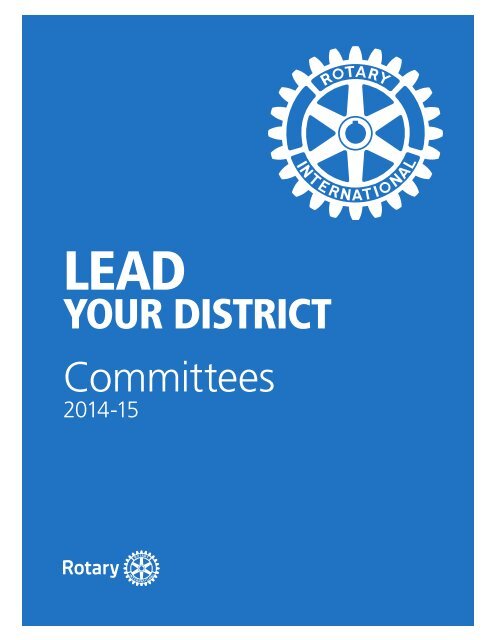
![La présidence du club [222-FR] - Rotary International](https://img.yumpu.com/25855726/1/190x245/la-presidence-du-club-222-fr-rotary-international.jpg?quality=85)

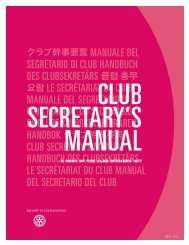

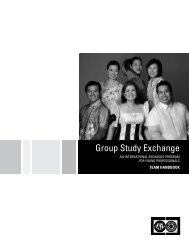
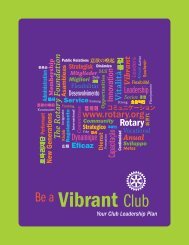
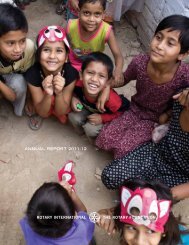
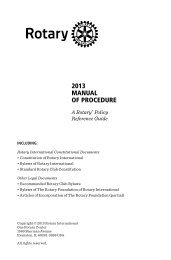


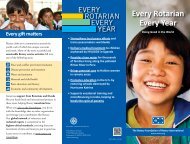
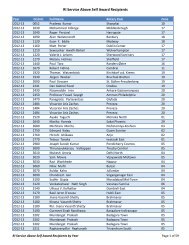
![La conférence de district [800-FR] - Rotary International](https://img.yumpu.com/25855636/1/190x245/la-conference-de-district-800-fr-rotary-international.jpg?quality=85)
